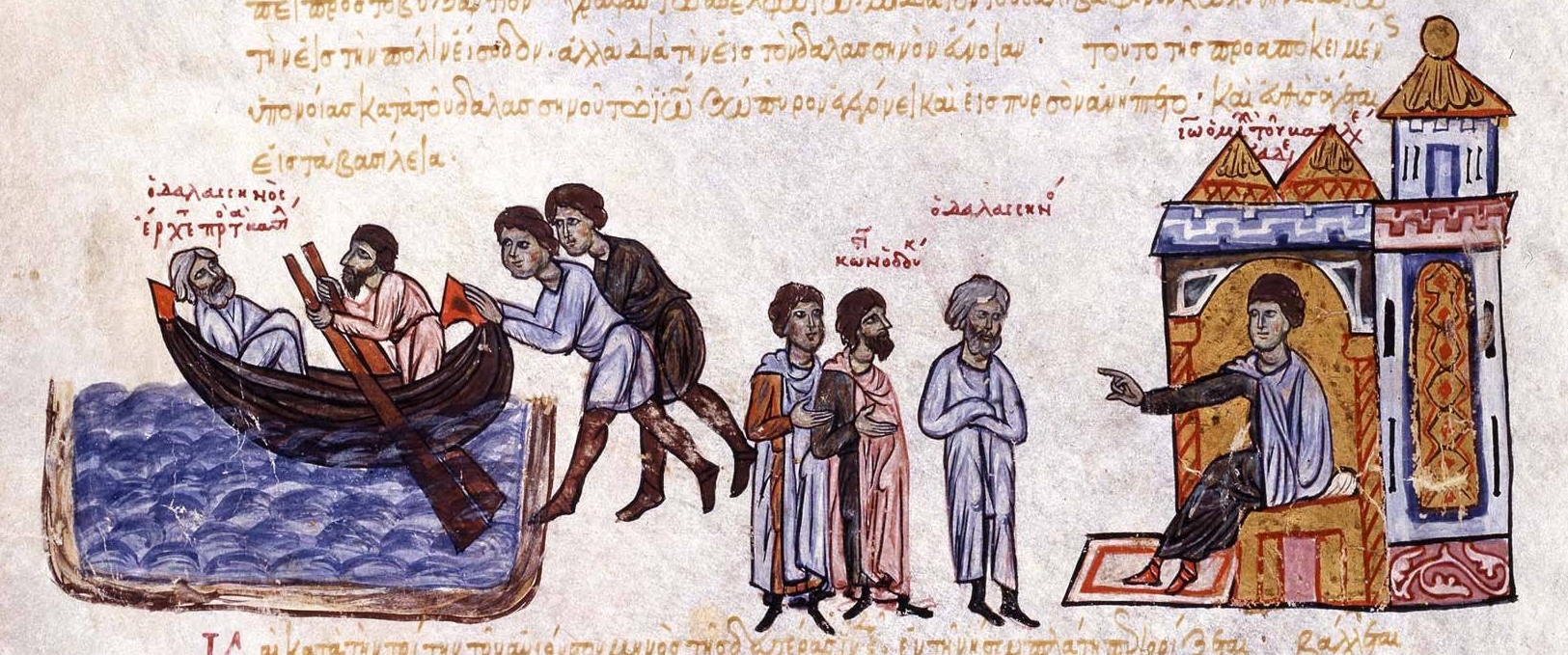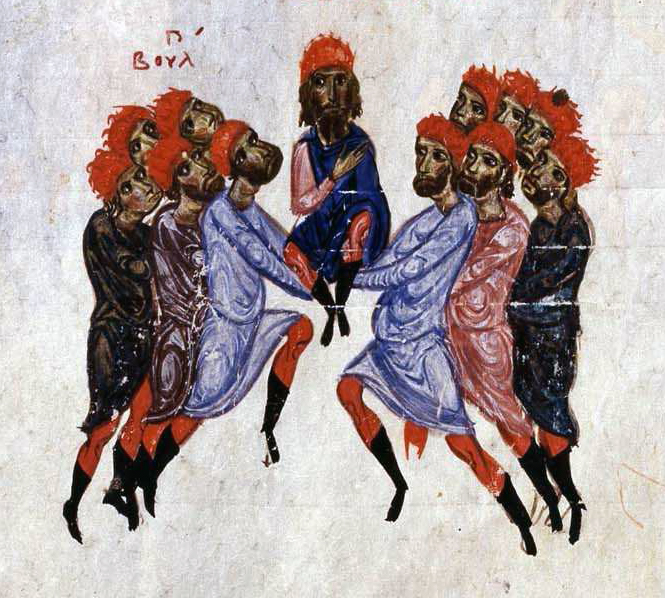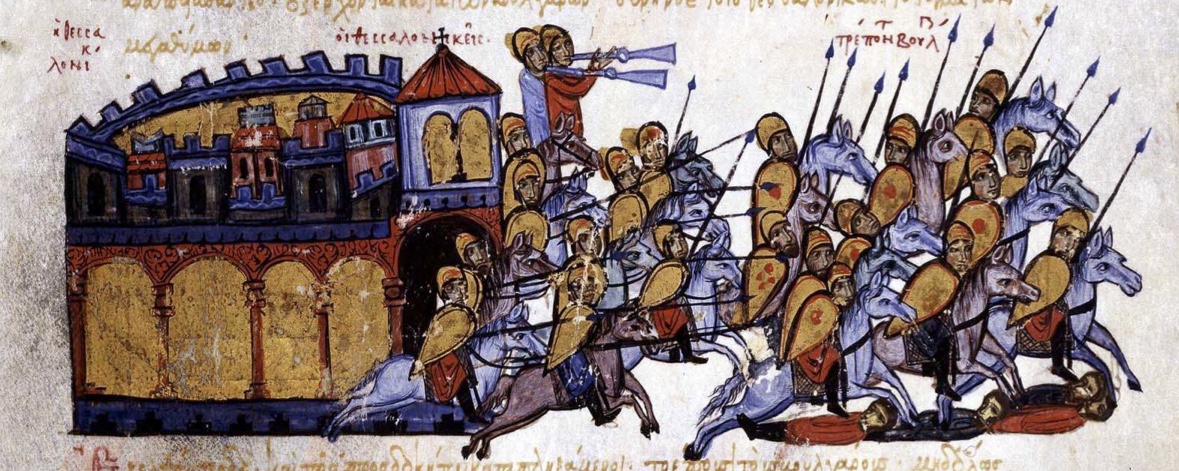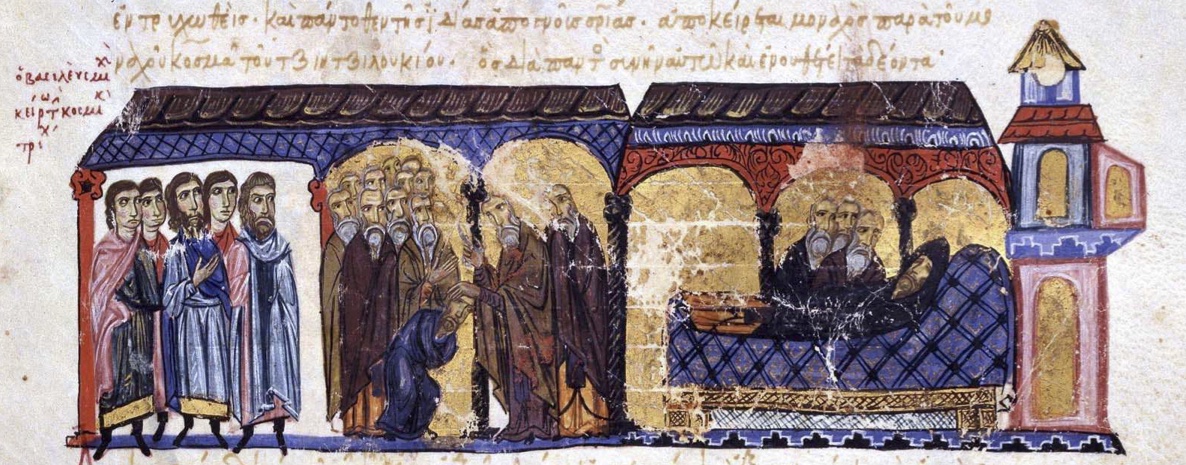Michael IV the Paphlagonian on:
[Wikipedia]
[Google]
[Amazon]
Michael IV the Paphlagonian ( el, , ''Mikhaēl ho Paphlagōn''; c. 1010 – 10 December 1041) was
 Romanos became ill in early 1034, and it was widely believed that Zoë and Michael had poisoned him. On 11 April Romanos was found dying in his bath. According to court official and later chronicler
Romanos became ill in early 1034, and it was widely believed that Zoë and Michael had poisoned him. On 11 April Romanos was found dying in his bath. According to court official and later chronicler 
 Michael IV was handsome, clever and generous, but
Michael IV was handsome, clever and generous, but  In 1034 Michael ordered the arrest of Constantine Dalassenos on suspicion of treason, accused of fomenting insurrection at Antioch. In 1037 Zoë conspired to have John the Eunuch poisoned. In 1038 Michael's brother, Constantine, suppressed an uprising of the armies in
In 1034 Michael ordered the arrest of Constantine Dalassenos on suspicion of treason, accused of fomenting insurrection at Antioch. In 1037 Zoë conspired to have John the Eunuch poisoned. In 1038 Michael's brother, Constantine, suppressed an uprising of the armies in
 In terms of military affairs, Michael's reign began poorly. The Arabs sacked Myra, the
In terms of military affairs, Michael's reign began poorly. The Arabs sacked Myra, the  On the western front, Michael and John ordered the general George Maniakes to conquer the Emirate of Sicily. In 1038 Maniakes landed in southern Italy and soon captured Messina. He then defeated the scattered Arab forces and captured towns in the west and south of the island. By 1040 he had stormed and taken Syracuse. He almost succeeded in driving the Arabs from the island, but Maniakes then fell out with his Lombard allies, while his Norman mercenaries, unhappy with their pay, abandoned the Byzantine general and raised a revolt on the Italian mainland, resulting in the temporary loss of Bari. Maniakes was about to strike against them when he was recalled by John the Eunuch on suspicion of conspiracy.Treadgold, pg. 588 After Maniakes's recall, most of the Sicilian conquests were lost and an expedition against the Normans suffered several defeats, although Bari was eventually recaptured.Treadgold, pg. 587–89
On the western front, Michael and John ordered the general George Maniakes to conquer the Emirate of Sicily. In 1038 Maniakes landed in southern Italy and soon captured Messina. He then defeated the scattered Arab forces and captured towns in the west and south of the island. By 1040 he had stormed and taken Syracuse. He almost succeeded in driving the Arabs from the island, but Maniakes then fell out with his Lombard allies, while his Norman mercenaries, unhappy with their pay, abandoned the Byzantine general and raised a revolt on the Italian mainland, resulting in the temporary loss of Bari. Maniakes was about to strike against them when he was recalled by John the Eunuch on suspicion of conspiracy.Treadgold, pg. 588 After Maniakes's recall, most of the Sicilian conquests were lost and an expedition against the Normans suffered several defeats, although Bari was eventually recaptured.Treadgold, pg. 587–89
 In the north, Pecheneg pressure had initially forced the Serbs to seek the protection of the Byzantine Empire and acknowledge Byzantine authority. In 1040 the Serbs again revolted, as did the Bulgarians. This uprising was partly caused by the heavy taxation in coin (and not, as before, in kind) imposed on Bulgaria by John's policies. It also aimed at the restoration of the Bulgarian state under the leadership of Peter Delyan. The rebels seized
In the north, Pecheneg pressure had initially forced the Serbs to seek the protection of the Byzantine Empire and acknowledge Byzantine authority. In 1040 the Serbs again revolted, as did the Bulgarians. This uprising was partly caused by the heavy taxation in coin (and not, as before, in kind) imposed on Bulgaria by John's policies. It also aimed at the restoration of the Bulgarian state under the leadership of Peter Delyan. The rebels seized  At this point, Michael's epilepsy left him half paralysed and he developed a severe case of dropsy, which caused his legs to become
At this point, Michael's epilepsy left him half paralysed and he developed a severe case of dropsy, which caused his legs to become 
 Despite his triumphant campaign, it was now clear to all that Michael was dying. He sought heavenly aid by visiting the shrine of Saint Demetrius at Thessalonica and by building or rebuilding churches. In 1039 he gave monetary gifts to every monk and priest in the empire and also to any parents who made him a godfather to their children. John the Eunuch, eager to ensure that power remained in his hands, forced Zoë to adopt Michael's and his nephew, their sister's son, also named Michael. After taking Holy Orders, on 10 December 1041 Michael IV died, refusing to the last to see his wife, who begged that she be allowed to visit him one more time. His nephew was crowned emperor as
Despite his triumphant campaign, it was now clear to all that Michael was dying. He sought heavenly aid by visiting the shrine of Saint Demetrius at Thessalonica and by building or rebuilding churches. In 1039 he gave monetary gifts to every monk and priest in the empire and also to any parents who made him a godfather to their children. John the Eunuch, eager to ensure that power remained in his hands, forced Zoë to adopt Michael's and his nephew, their sister's son, also named Michael. After taking Holy Orders, on 10 December 1041 Michael IV died, refusing to the last to see his wife, who begged that she be allowed to visit him one more time. His nephew was crowned emperor as
Byzantine Emperor
This is a list of the Byzantine emperors from the foundation of Constantinople in 330 AD, which marks the conventional start of the Eastern Roman Empire, to its fall to the Ottoman Empire in 1453 AD. Only the emperors who were recognized as ...
from 11 April 1034 to his death on 10 December 1041.
The son of a peasant, Michael worked as a money changer until he was found a job at court by his brother John the Orphanotrophos. He caught the eye of the empress Zoë Porphyrogenita and they began a tempestuous and flagrant affair. It is believed that they conspired to murder her husband, Emperor Romanos III Argyros
Romanos III Argyros ( el, Ρωμανός Αργυρός; Latinized Romanus III Argyrus; 968 – 11 April 1034), or Argyropoulos was Byzantine Emperor from 1028 until his death. He was a Byzantine noble and senior official in Constantinople whe ...
, who died in 1034. Michael and Zoë were married the same day and Michael was crowned emperor the day after.
Michael, handsome and energetic, had poor health and entrusted most of the business of government to his brother. He distrusted Zoë and went to lengths to ensure that he did not suffer the same fate as his predecessor. The fortunes of the Empire under Michael's reign were mixed. His most triumphant moment came in 1041 when he led the imperial army against Bulgaria
Bulgaria (; bg, България, Bǎlgariya), officially the Republic of Bulgaria,, ) is a country in Southeast Europe. It is situated on the eastern flank of the Balkans, and is bordered by Romania to the north, Serbia and North Macedo ...
n rebels. He returned from this victory, but died a few months later.
Early life and career
Michael came from a family of Greek peasants from Paphlagonia. He worked inConstantinople
la, Constantinopolis ota, قسطنطينيه
, alternate_name = Byzantion (earlier Greek name), Nova Roma ("New Rome"), Miklagard/Miklagarth (Old Norse), Tsargrad ( Slavic), Qustantiniya (Arabic), Basileuousa ("Queen of Cities"), Megalopolis (" ...
as a money changer, and was rumored to have a secret second occupation as a counterfeiter of coins. One of Michael's brothers, John the Orphanotrophos, also known as John the Eunuch, was the '' parakoimomenos'', a senior courtier who presided over the women's quarters at the imperial palace. John obtained jobs for several of his younger brothers in the court.Norwich, pg. 283Kazhdan, pg. 1365
Romanos Argyros became emperor of the Byzantine Empire
The Byzantine Empire, also referred to as the Eastern Roman Empire or Byzantium, was the continuation of the Roman Empire primarily in its eastern provinces during Late Antiquity and the Middle Ages, when its capital city was Constantinopl ...
as Romanos III in 1028. "As a ruler he had no ability whatsoever", and his private life was troubled by his failure to conceive a child with his wife Empress Zoë.Garland, ''Zoë Porphyrogenita'' The couple became alienated, with Romanos taking a mistress and Zoë engaging in a number of affairs. She was enamoured of the handsome young Michael to the extent of flaunting him openly and speaking of making him emperor. Romanos confronted Michael, who denied the accusations, swearing his innocence on holy relics. His suspicions assuaged, Romanos allowed Michael to become his personal servant in 1033.Kazhdan, pg. 2228
 Romanos became ill in early 1034, and it was widely believed that Zoë and Michael had poisoned him. On 11 April Romanos was found dying in his bath. According to court official and later chronicler
Romanos became ill in early 1034, and it was widely believed that Zoë and Michael had poisoned him. On 11 April Romanos was found dying in his bath. According to court official and later chronicler Michael Psellus
Michael Psellos or Psellus ( grc-gre, Μιχαὴλ Ψελλός, Michaḗl Psellós, ) was a Byzantine Greek monk, savant, writer, philosopher, imperial courtier, historian and music theorist. He was born in 1017 or 1018, and is believed to hav ...
, some of his retinue had "held his head for a long time beneath the water, attempting at the same time to strangle him".Norwich, pg. 278 John Scylitzes writes as a simple fact that Romanos was drowned on Michael's orders. Matthew of Edessa's account has Zoë poisoning Romanos. Zoë and Michael were married on the day that Romanos III died. The next day the couple summoned the Patriarch
The highest-ranking bishops in Eastern Orthodoxy, Oriental Orthodoxy, the Catholic Church (above major archbishop and primate), the Hussite Church, Church of the East, and some Independent Catholic Churches are termed patriarchs (and in c ...
Alexios I
Alexios I Komnenos ( grc-gre, Ἀλέξιος Κομνηνός, 1057 – 15 August 1118; Latinized Alexius I Comnenus) was Byzantine emperor from 1081 to 1118. Although he was not the first emperor of the Komnenian dynasty, it was during ...
to officiate at the coronation of the new emperor. Alexios refused to co-operate until the payment of 50 pounds of gold helped change his mind. He crowned Michael as the new Emperor of the Romans as Michael IV.Treadgold, pg. 586

Reign
Domestic policies
 Michael IV was handsome, clever and generous, but
Michael IV was handsome, clever and generous, but epilepsy
Epilepsy is a group of non-communicable neurological disorders characterized by recurrent epileptic seizures. Epileptic seizures can vary from brief and nearly undetectable periods to long periods of vigorous shaking due to abnormal electrica ...
and a lack of education prevented him from assuming many of his imperial duties. He was initially reliant on others to direct the government in his name, and afforded significant responsibilities to his brother John, who had already become an influential minister under Constantine VIII and Romanos III.Norwich, pg. 287 Zoë was disappointed in her hopes that Michael would prove a more devoted husband than Romanos. Fearing that the empress might turn on him as she had turned on his predecessor, Michael excluded her from politics and confined her to the palace '' gynaeceum'' (women's quarters). There a watch was kept on Zoë’s activities, and Michael seldom visited her.
John's reforms of the army and financial system revived the strength of the Empire against its foreign enemies but increased taxes, which caused discontent among the nobility and the commons. John's monopoly of the government and the introduction of such taxes as the '' Aerikon'' led to several conspiracies against him and Michael.Kazhdan, pg. 1365 Poor harvests and famine caused by bad weather and by a locust plague in 1035 exacerbated discontent. When Michael tried to exercise a measure of control over Aleppo, the local citizens drove off the imperial governor.Treadgold, pg. 586Treadgold, pg. 587 There were revolts at Antioch
Antioch on the Orontes (; grc-gre, Ἀντιόχεια ἡ ἐπὶ Ὀρόντου, ''Antiókheia hē epì Oróntou'', Learned ; also Syrian Antioch) grc-koi, Ἀντιόχεια ἡ ἐπὶ Ὀρόντου; or Ἀντιόχεια ἡ ἐπ� ...
, Nicopolis and in Bulgaria
Bulgaria (; bg, България, Bǎlgariya), officially the Republic of Bulgaria,, ) is a country in Southeast Europe. It is situated on the eastern flank of the Balkans, and is bordered by Romania to the north, Serbia and North Macedo ...
.
 In 1034 Michael ordered the arrest of Constantine Dalassenos on suspicion of treason, accused of fomenting insurrection at Antioch. In 1037 Zoë conspired to have John the Eunuch poisoned. In 1038 Michael's brother, Constantine, suppressed an uprising of the armies in
In 1034 Michael ordered the arrest of Constantine Dalassenos on suspicion of treason, accused of fomenting insurrection at Antioch. In 1037 Zoë conspired to have John the Eunuch poisoned. In 1038 Michael's brother, Constantine, suppressed an uprising of the armies in Anatolia
Anatolia, tr, Anadolu Yarımadası), and the Anatolian plateau, also known as Asia Minor, is a large peninsula in Western Asia and the westernmost protrusion of the Asian continent. It constitutes the major part of modern-day Turkey. The re ...
. In 1040 a conspiracy involved the priest Michael Keroularios, who became a monk to save his life and was elected Patriarch of Constantinople under Michael's successor. During the Bulgarian uprising of 1040, John the Eunuch arrested suspected plotters in Anatolia and Constantinople who were hoping to take advantage of the turmoil but was unable to capture the Strategos
''Strategos'', plural ''strategoi'', Latinized ''strategus'', ( el, στρατηγός, pl. στρατηγοί; Doric Greek: στραταγός, ''stratagos''; meaning "army leader") is used in Greek to mean military general. In the Helleni ...
(military governor) of Theodosiopolis, who joined the rebellion and attempted to capture Thessalonica.Treadgold, pg. 588Finlay, pg. 485
Foreign and military affairs
 In terms of military affairs, Michael's reign began poorly. The Arabs sacked Myra, the
In terms of military affairs, Michael's reign began poorly. The Arabs sacked Myra, the Serbs
The Serbs ( sr-Cyr, Срби, Srbi, ) are the most numerous South Slavs, South Slavic ethnic group native to the Balkans in Southeastern Europe, who share a common Serbian Cultural heritage, ancestry, Culture of Serbia, culture, History of ...
threw off Byzantine authority and the Pechenegs
The Pechenegs () or Patzinaks tr, Peçenek(ler), Middle Turkic: , ro, Pecenegi, russian: Печенег(и), uk, Печеніг(и), hu, Besenyő(k), gr, Πατζινάκοι, Πετσενέγοι, Πατζινακίται, ka, პა� ...
raided almost at will up to the gates of Thessalonica. The situation was soon stabilised: on the eastern frontier, Arab pirates were either captured or killed; the Byzantines captured the Muslim
Muslims ( ar, المسلمون, , ) are people who adhere to Islam, a monotheistic religion belonging to the Abrahamic tradition. They consider the Quran, the foundational religious text of Islam, to be the verbatim word of the God of Abrah ...
fortress of Berkri
Muradiye ( ku, Bêgirî, hy, Բերկրի, translit=Berkri) is a town and district in the Van Province of Turkey.
History
The tenth-century Byzantine text ''De Administrando Imperio'' mentions "Perkri" belonging to King Ashot I Bagratuni at t ...
, on the eastern shore of Lake Van
Lake Van ( tr, Van Gölü; hy, Վանա լիճ, translit=Vana lič̣; ku, Gola Wanê) is the largest lake in Turkey. It lies in the far east of Turkey, in the provinces of Van and Bitlis in the Armenian highlands. It is a saline soda lake ...
; Edessa was relieved after a long siege and eventually ceded to the empire in 1037.Treadgold, pg. 586–87
 On the western front, Michael and John ordered the general George Maniakes to conquer the Emirate of Sicily. In 1038 Maniakes landed in southern Italy and soon captured Messina. He then defeated the scattered Arab forces and captured towns in the west and south of the island. By 1040 he had stormed and taken Syracuse. He almost succeeded in driving the Arabs from the island, but Maniakes then fell out with his Lombard allies, while his Norman mercenaries, unhappy with their pay, abandoned the Byzantine general and raised a revolt on the Italian mainland, resulting in the temporary loss of Bari. Maniakes was about to strike against them when he was recalled by John the Eunuch on suspicion of conspiracy.Treadgold, pg. 588 After Maniakes's recall, most of the Sicilian conquests were lost and an expedition against the Normans suffered several defeats, although Bari was eventually recaptured.Treadgold, pg. 587–89
On the western front, Michael and John ordered the general George Maniakes to conquer the Emirate of Sicily. In 1038 Maniakes landed in southern Italy and soon captured Messina. He then defeated the scattered Arab forces and captured towns in the west and south of the island. By 1040 he had stormed and taken Syracuse. He almost succeeded in driving the Arabs from the island, but Maniakes then fell out with his Lombard allies, while his Norman mercenaries, unhappy with their pay, abandoned the Byzantine general and raised a revolt on the Italian mainland, resulting in the temporary loss of Bari. Maniakes was about to strike against them when he was recalled by John the Eunuch on suspicion of conspiracy.Treadgold, pg. 588 After Maniakes's recall, most of the Sicilian conquests were lost and an expedition against the Normans suffered several defeats, although Bari was eventually recaptured.Treadgold, pg. 587–89
 In the north, Pecheneg pressure had initially forced the Serbs to seek the protection of the Byzantine Empire and acknowledge Byzantine authority. In 1040 the Serbs again revolted, as did the Bulgarians. This uprising was partly caused by the heavy taxation in coin (and not, as before, in kind) imposed on Bulgaria by John's policies. It also aimed at the restoration of the Bulgarian state under the leadership of Peter Delyan. The rebels seized
In the north, Pecheneg pressure had initially forced the Serbs to seek the protection of the Byzantine Empire and acknowledge Byzantine authority. In 1040 the Serbs again revolted, as did the Bulgarians. This uprising was partly caused by the heavy taxation in coin (and not, as before, in kind) imposed on Bulgaria by John's policies. It also aimed at the restoration of the Bulgarian state under the leadership of Peter Delyan. The rebels seized Belgrade
Belgrade ( , ;, ; names in other languages) is the capital and largest city in Serbia. It is located at the confluence of the Sava and Danube rivers and the crossroads of the Pannonian Plain and the Balkan Peninsula. Nearly 1,166,763 mi ...
, proclaimed Delyan Emperor of Bulgaria and then quickly took Scupi
Scupi (''Σκούποι'' in ancient greek) is an archaeological site located between Zajčev Rid (''Зајчев Рид'' 'Rabbit Hill') and the Vardar River, several kilometers from the center of Skopje in North Macedonia. A Roman military camp ...
. Michael IV made things worse by removing from command the '' doux'' of Dyrrhachium, who had been marching against Peter Delyan, accusing him of a conspiracy. His troops, largely Bulgarian, joined the revolt and Delyan laid siege to Thessalonica. Dyrrhachium had been lost and Delyan defeated the ''Strategos'' of Hellas. Most of the theme of Nicopolis had risen up against Michael, disgusted with the greed of John the Eunuch.Treadgold, pg. 587–89
 At this point, Michael's epilepsy left him half paralysed and he developed a severe case of dropsy, which caused his legs to become
At this point, Michael's epilepsy left him half paralysed and he developed a severe case of dropsy, which caused his legs to become gangrenous
Gangrene is a type of tissue death caused by a lack of blood supply. Symptoms may include a change in skin color to red or black, numbness, swelling, pain, skin breakdown, and coolness. The feet and hands are most commonly affected. If the gan ...
. When he announced that he intended to lead the imperial army against the Bulgarians, his advisors were aghast. Michael set off towards Macedonia with an army of 40,000 men in 1041, assisted by Norse mercenaries, including the future King Harald III of Norway. Gathering his forces at Mosynopolis the Emperor waited for the Bulgarian army. The military position of the Byzantines was aided by internal dissension among the Bulgarians. Michael advanced, relieving Thessalonica then bringing the Bulgarians to battle, defeating them and capturing Delyan. Michael pushed his army aggressively into Bulgaria. The largest remaining Bulgarian contingent was at Prilep
Prilep ( mk, Прилеп ) is the fourth-largest city in North Macedonia. It has a population of 66,246 and is known as "the city under Marko's Towers" because of its proximity to the towers of Prince Marko.
Name
The name of Prilep appea ...
in a fortified camp commanded by Manuel Ivats. The Byzantines stormed the camp, scattered the Bulgarians and captured Ivats. The rigours of the campaign brought Michael close to death, but he was able to return to Constantinople in triumph.Norwich, pg. 286, 289Treadgold, pg. 587

Final illness and death
 Despite his triumphant campaign, it was now clear to all that Michael was dying. He sought heavenly aid by visiting the shrine of Saint Demetrius at Thessalonica and by building or rebuilding churches. In 1039 he gave monetary gifts to every monk and priest in the empire and also to any parents who made him a godfather to their children. John the Eunuch, eager to ensure that power remained in his hands, forced Zoë to adopt Michael's and his nephew, their sister's son, also named Michael. After taking Holy Orders, on 10 December 1041 Michael IV died, refusing to the last to see his wife, who begged that she be allowed to visit him one more time. His nephew was crowned emperor as
Despite his triumphant campaign, it was now clear to all that Michael was dying. He sought heavenly aid by visiting the shrine of Saint Demetrius at Thessalonica and by building or rebuilding churches. In 1039 he gave monetary gifts to every monk and priest in the empire and also to any parents who made him a godfather to their children. John the Eunuch, eager to ensure that power remained in his hands, forced Zoë to adopt Michael's and his nephew, their sister's son, also named Michael. After taking Holy Orders, on 10 December 1041 Michael IV died, refusing to the last to see his wife, who begged that she be allowed to visit him one more time. His nephew was crowned emperor as Michael V Michael V may refer to:
*Michael V Kalaphates (1015–1042), Byzantine Emperor
*Coptic Pope Michael V of Alexandria (fl. 1145–1146)
*Michael V.
Beethoven Del Valle Bunagan (born December 17, 1969), known professionally as Michael V. and a ...
.Kazhdan, pg. 1365, 2228
See also
* List of Byzantine emperorsReferences
Sources
Primary *Michael Psellus
Michael Psellos or Psellus ( grc-gre, Μιχαὴλ Ψελλός, Michaḗl Psellós, ) was a Byzantine Greek monk, savant, writer, philosopher, imperial courtier, historian and music theorist. He was born in 1017 or 1018, and is believed to hav ...
, ''Chronographia''.
*
Secondary
*
*
*
*
*
*
{{DEFAULTSORT:Michael 04 the Paphlagonian
Macedonian dynasty
11th-century Byzantine emperors
People with epilepsy
1010s births
1041 deaths
Eastern Orthodox monarchs
Byzantine people of the Byzantine–Bulgarian Wars
Byzantine Paphlagonians
Royalty and nobility with disabilities
Uprising of Peter Delyan